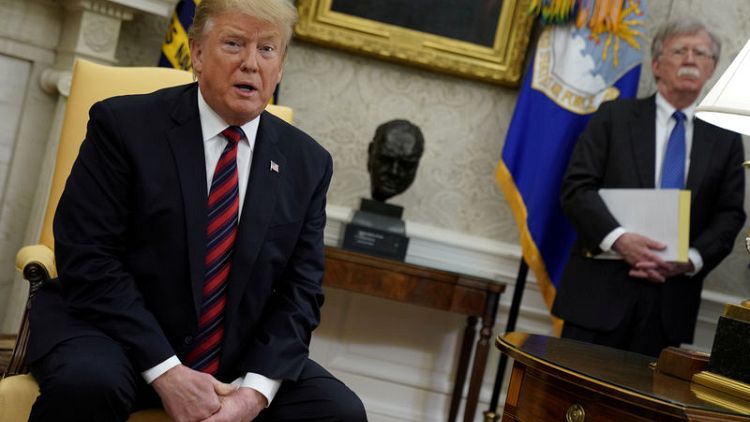GENEVA (Reuters) - Iran will on Wednesday announce "reciprocal actions" on the one-year anniversary of the U.S. withdrawal from world powers' 2015 nuclear deal with Tehran, the semi-official ISNA news agency reported on Monday, quoting “knowledgeable sources.”
The Islamic Republic itself is not planning to pull out of the landmark nuclear agreement, the report noted, without spelling out what action Tehran intended to take.
Some European Union leaders had been unofficially told of Iran's decision, the report said.
U.S. President Donald Trump announced the U.S. pullout on May 8 last year and subsequently reimposed tough sanctions on Iran, including on its lifeblood oil exports with the stated intent of reducing them to zero and starving Iran's economy.
Trump, who was not in office when the nuclear deal was negotiated, said it was flawed in Iran's favour for doing nothing to curb its ballistic missile programme or its support of proxy forces in several Middle East wars.
Iran has said its development of ballistic missiles has nothing to do with its nuclear activity and is wholly defensive in nature, and that its support for allies around the Middle East is not Washington's business.
Under the 2015 deal, Iran restricted the capacity of its uranium enrichment programme - widely seen as a route to developing a nuclear weapon - in exchange for a lifting of most international sanctions. U.N. nuclear inspectors have repeatedly verified Iranian compliance with the accord.
The other signatories to the deal - European powers Germany, France and Britain - and Russia and China remain committed to it. The EU has been looking into ways of preserving its economic benefits that Iran says must stay or it could abandon the deal.
The Trump administration is now deploying a carrier strike group and bombers to the Middle East in response to troubling “indications and warnings” from Iran and to show the United States will retaliate with “unrelenting force” to any attack, U.S. national security adviser John Bolton said on Sunday.
Bolton - who has spearheaded an increasingly hawkish U.S. policy on Iran - said the decision, which could exacerbate tensions between the two countries, was meant to send a “clear and unmistakable message” of U.S. resolve to Tehran.
Though he cited no specific Iranian activities that have raised new concerns, Iran has recently warned it would block the Strait of Hormuz if it was barred from using the strategic waterway. About a fifth of the oil consumed globally passes through the strait.
U.S. Secretary of State Mike Pompeo also issued a warning to the Islamic Republic on Sunday.
“It is absolutely the case that we have seen escalatory actions from the Iranians and it is equally the case that we will hold the Iranians accountable for attacks on American interests,” Pompeo told reporters aboard a flight en route to an Arctic Council meeting in Finland.
“If these actions take place, if they do by some third-party proxy, a militia group, Hezbollah, we will hold the Iranian leadership directly accountable for that.”
(Reporting by Babak Dehghanpisheh with additional reporting by Lesley Wroughton; Editing by Mark Heinrich)
